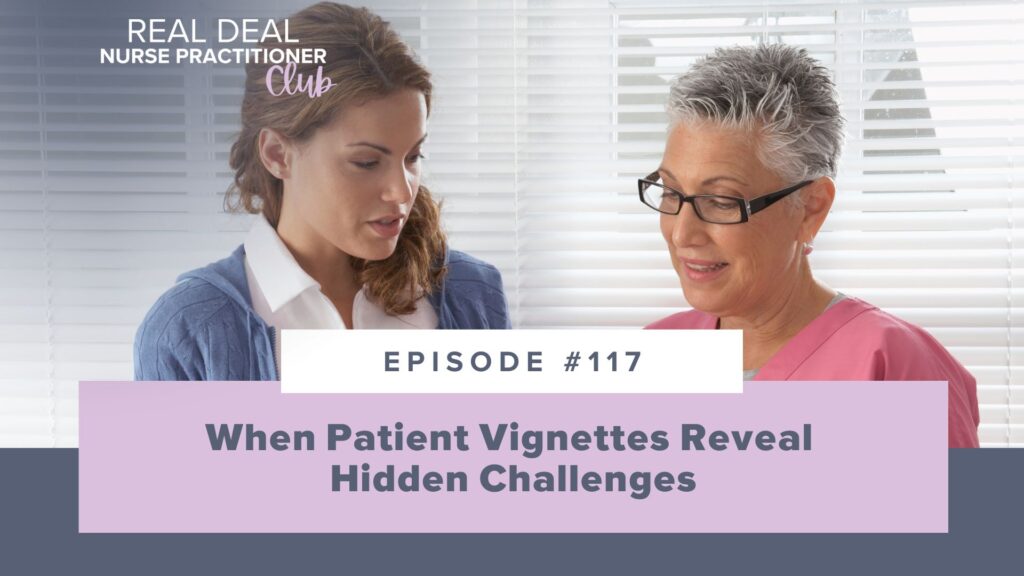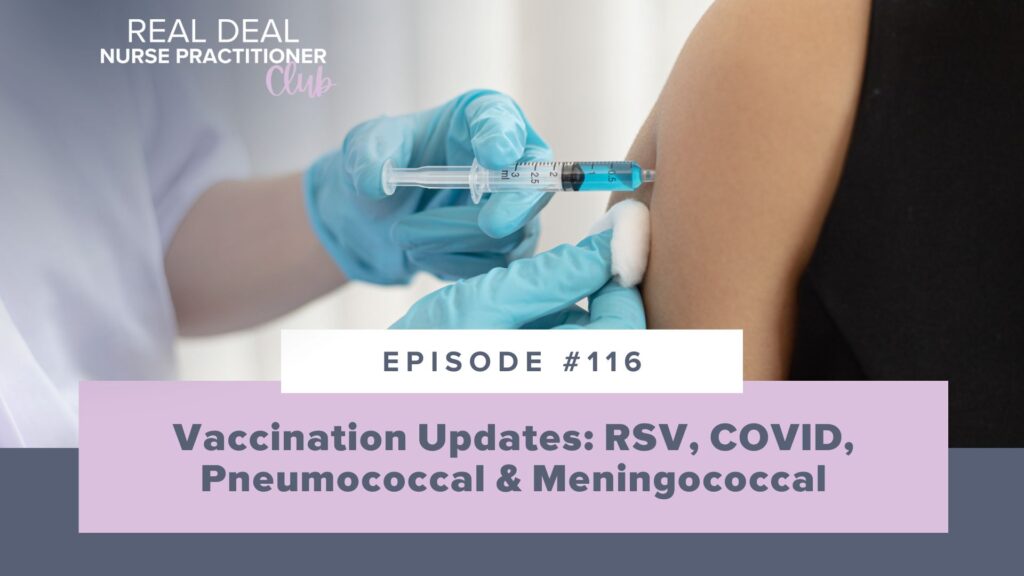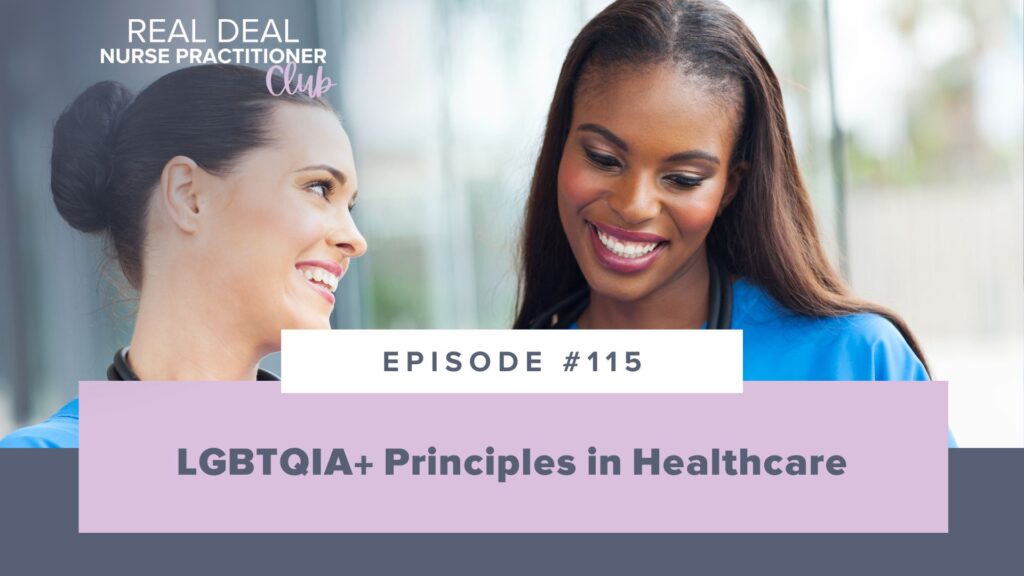Ep #92: “What Should I Be Doing When?” with Anna
- by
- Jul 26, 2023
- Podcasts
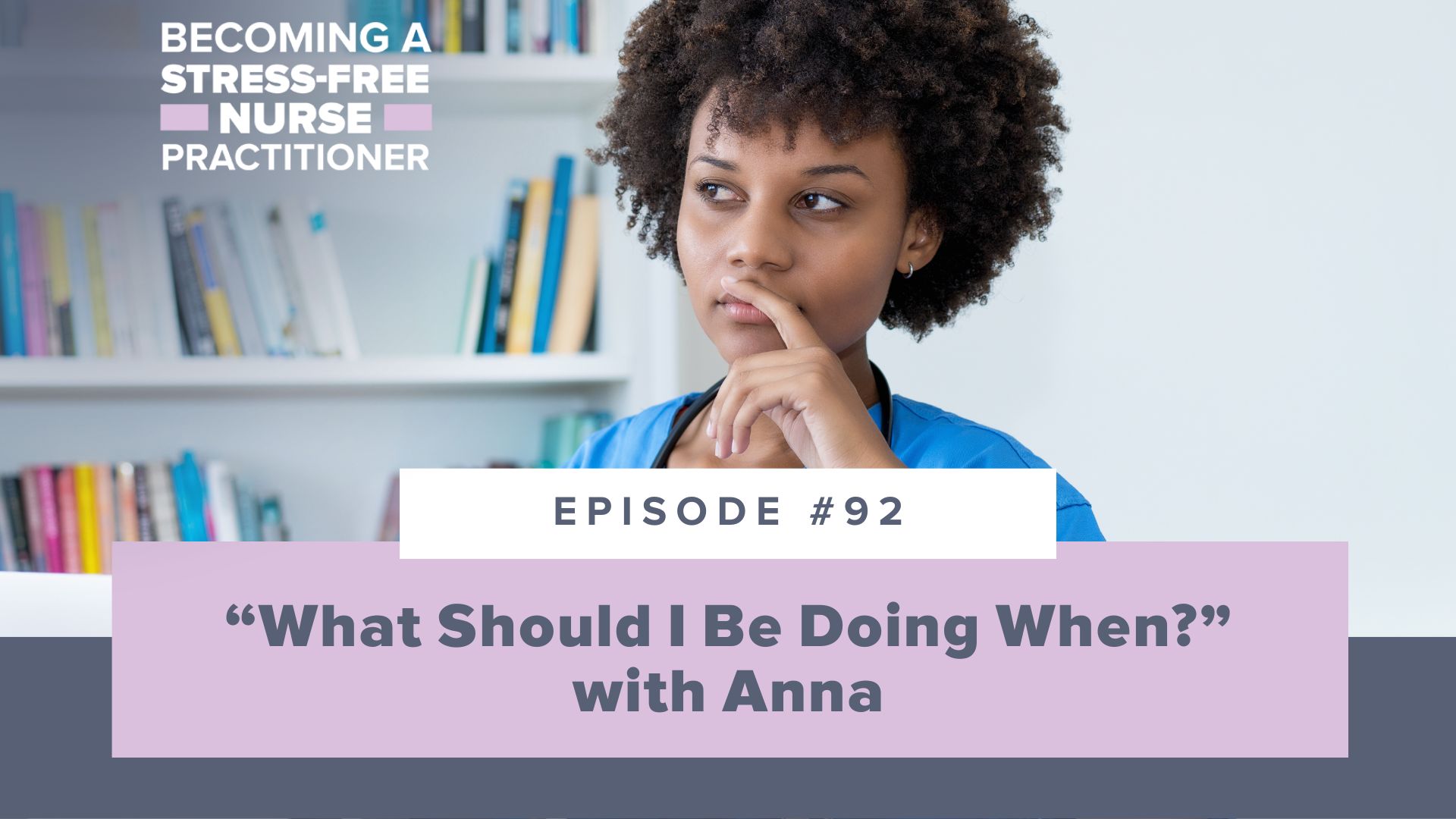
One question that we receive all the time in our community and on every platform with which we engage with our students is, “What should I be doing and when?”
This question tends to come up no matter what phase of the Nurse Practitioner journey someone is in – whether they’re a brand new Nurse Practitioner student, in clinicals, about to graduate, or have already graduated but feel out of the game. I’m here with Anna this week to paint a picture of what you should be doing and when, and how we can help you.
Join us on this episode as Anna and I highlight all the ways we can support you, no matter where you are on your Nurse Practitioner journey. You’ll hear why what you should be doing and when will look different for each individual person, how our resources can help, and how to find what’s applicable to you right now.
If you’re looking for support, no matter what phase of your nurse practitioner journey you’re currently in, I have communities available for both students and new nurse practitioners. In these communities, we work to uplift one another and grow this profession together every day, so click here to check them out!
What You Will Discover:
- Our thoughts on what you should be doing when you’re brand new to Nurse Practitioner school.
- The stage of the Nurse Practitioner journey where most people begin wondering what they should be doing.
- Our recommendations for those of you who are about to graduate.
- How to avoid overwhelming yourself, no matter where you are on the NP journey.
- What we would offer to those of you who have graduated but feel out of the game.
Featured on the Show:
- If you’re looking for extra support, I have communities available for both students and new nurse practitioners. Click here if you’re a student, and click here if you’re a new NP!
- Follow me on: Facebook | Instagram | YouTube | TikTok
Full Episode Transcript:

Welcome to Becoming a Stress-Free Nurse Practitioner, a show for new NPs and students that want to pass their board exam the first time and make that transition from RN to NP as seamless as possible. I’m your host Sarah Michelle. Now, let’s dive into today’s episode.
Sarah: Hey everyone, it’s Sarah and Anna here again today. And the question that we get all the time in our Facebook communities and emails and everywhere else that we’re talking to students is what should I be doing when? And so what I mean by this question is like if I’m brand new to nurse practitioner school, what should I be doing? Should I already be preparing for boards? What does that look like?
There are all these questions that come along all the different phases of your journey. So whether you are a new nurse practitioner student, if you’re in clinicals, if you’re about to graduate, maybe you’ve already graduated. Maybe there are people out there listening to this podcast right now who have already graduated and failed, those sorts of things. We just kind of want to paint the path of what this journey can look like and how we can help you.
And so I think the easiest place to start is when you are brand new, I always call these students the freshies, like when you’re brand new and fresh to nurse practitioner school, what should you be doing, if anything? Anna, what do you think?
Anna: So this is a tough question because there are so many things I think they can be doing to set them up for success. And getting that supportive community as part of that, I think, is huge. But I want to throw the little caveat out there that if you have been in nurse practitioner school for a while and you didn’t do these things, it’s not too late. It is never too late.
If you are a new NP student and you are listening to it, yes, there are things you can be doing that are free, they are there, they’re easy for you. And one of those is just joining our Facebook group. We have an amazing Facebook community of students on all different timelines of their journey.
Some are new students. Some are currently in clinicals. Some are about to take their boards. And some have been graduated for a while and are just hanging around because they like our little content reviews that we do there. I met a lot of those people when we had our conference recently.
And so just finding that supportive community, finding that Facebook group of not only supportive students like you, supportive nurse practitioners helping guide you, but also, like I said, just little bits and pieces of the content review will help you tremendously as you go about your studies.
Sarah: And you’ll be so excited about how much you learn along the way. And I think when you first come into the Facebook community or first kind of come into like our little corner of the internet, it can be a little bit overwhelming because we offer, especially in regards to free resources, we offer a lot of free things. We have this podcast, we have an entire YouTube channel that we put out weekly videos, we have the Facebook group, et cetera.
So I do want to make the point that, yes, these resources are available to you, we put them out for you. But you don’t have to do them all either. If the Facebook group is the right fit for you to kind of just pop in and pop out as you need to as you’re a new student, as you’re figuring yourself out, what will my life look like as an advanced provider one day? How can I change my mindset? There are all these different pieces that come into being a new nurse practitioner student.
So you can just pick one or two of these free resources to really lean into. And that way you have them available to you when you kind of take those next steps and you start to transition. Because I feel like when you are a new nurse practitioner student and you’re taking the three P’s, the big transition point comes when you become a clinical student.
Because a lot of programs, what they will do is they’ll have you do all of your courses first or most of your courses first, and then that last year or that last year and a half is just heavy, intense clinical time. But it’s actually a really wonderful thing because then when you’re about to graduate, you have all these hours that are fresh under your belt like ready to roll. So when you graduate, you’ll be in a really good spot to start in a practice, because obviously that’s the goal.
Anna: Yeah, and I think when students start clinicals is probably where I see the most of students starting to ask this question like, am I behind? What should I be doing? I just learned so much over the past couple of years, how do I even start going into clinical and applying this knowledge? And that is where I think our crash course is a really, really excellent start.
Really build that confidence up, really tie all those loose ends together and just refresh on some content that maybe you learned a year ago that you have way back there in your brain, you just don’t quite remember it.
Sarah: Well the crash course is cool because in the crash course it’s all in question and answer style. There’s pretty much nothing else out there like it. And that way you can see for yourself, okay, what do I know? And if you don’t know something, then we give you these memory tools and mnemonics and other tricks.
So I can’t tell you how many times students have come back and they’re like, I’m so glad I got the crash course during clinicals because then when I was in clinical and we had a hypertension patient, I knew my little mnemonic or I knew my memory tool, and I was able to pull it out. And I really impressed my preceptor.
I really love when students come back and they’re like, oh, my preceptor was so excited about how much I knew. Because you’re learning all this information in school, you have it down pat. You just have to have the confidence in yourself. And sometimes having those little extra tidbits really does give you the confidence.
Anna: It really does. And it makes it so much more manageable having little memory tools, ways to make it fun, ways to make it memorable. It just makes it less overwhelming. And I mean, we have had students come back to us so much recently, which is just so fun, saying they’re using these memory tools and mnemonics even in practice now.
Sarah: Yeah, that’s really cool.
Anna: It’s stuff that is going to stick with you.
Sarah: And with our courses, too, every course that we offer has a study guide attached, which means when you’re in clinicals and you do the crash course and you fill out your study guide, you can continue to use that during that clinical year too, because I also get that feedback a lot. Like I brought my study guide into clinicals with me. We were able to look this up or think about this differently. And so I think that’s a really wonderful opportunity too.
Anna: Yeah. So I would highly, highly recommend doing a review course while you’re starting clinicals. I think the crash course is a great place to start. Figure out what you know, figure out maybe where you could use some refreshing and go from there.
Sarah: I also like the Q bank at this time too, because when you’re going through a question bank, number one, I remember going through Q banks on my lunch breaks and those sorts of things, or when I’m in between charts or in between patients during clinicals. Just something to kind of pass the time because a lot of Q banks you can either pull up on mobile browser or an app and do it on your phone.
And it just kind of keeps the information fresh. And it makes sure like, okay, I’ve memorized this information, but can I actually apply and use the information I’ve memorized? Because those are two totally different equations.
Anna: Yeah, they are very different. And in question banks, at least I know in our question bank, I mean, we present some questions like these clinical scenarios. So somebody comes in and they have this allergy or they have this comorbidity and now how does that flip the scenario a little bit?
And so you get to practice that on your own. You get to look through options, you get to read through these really detailed, amazing rationales that are walking you through every step of even what labs would you draw? Even if that wasn’t in the question, it might be in our rationale that we expand on. So you can really get a full picture view at those exact things that you’re then going to go into clinicals and see.
Sarah: Yeah, it just helps you integrate it in your brain so much more to really piece it together from all these different angles. Like see it in real life, pick it up in the Q bank, see it in the course. Everything starts to all mesh together and you’re like, oh, I actually understand this stuff.
Anna: And then you’re also like one step ahead when you are a new grad or you’re about to graduate, like right when you are thinking about your board exam.
Sarah: That was always me as a student. That’s why I was doing practice questions on my lunch breaks. I’m like, I just want to be one step ahead for boards. I just want to be ahead of the game a little bit so when the time comes, I’ll be ready.
Anna: And again, if you’re not there yet, that is totally okay. We are going to get to that and we still have so, so many resources. But while we’re talking about those new grads or those about to graduate, what do you tend to recommend for them, Sarah?
Sarah: I think it’s hard, a little bit. I think it depends on what type of personality and what type of student you are. So if you are actively preparing for boards, if you’re going to do a review course, you’re going to go one of two tracks. So either you’re going to do it yourself, you’re going to go DIY style, which means you’re going to get a recorded course, you’re going to review it on your own time. Maybe it’ll take you a month, maybe it’ll take two, et cetera. You’re just kind of setting up your own timeline, your own schedule. So get the courses, you get a Q bank.
The other vibe, and this is definitely more of the pocket that I fell into, which is how the live study groups were created, is I just wanted something done for me. Like there was so much overwhelm as I got into different Facebook groups and talked to students and talked to my classmates and they were like, well, I’m doing this, what are you doing? And there was just a lot of back and forth and everybody was really almost unsure.
And so if you are much more of like anxious, type A, which is me, the live study group is an excellent fit because it’s just a five week calendar to say, hey, I’m going to log in today. I’m going to watch these four videos, it’s going to take me less than an hour. I’m going to do these 30 questions in the practice bank and I’m going to be done.
If somebody had done that for me, I literally would have hugged them around the neck.
Anna: Same, same. That’s what I was going to say, is I think it does depend on what type of learner you are and how you want to go about it, what you’re looking for. I always say look into what formats of review courses there are for what’s going to fit you best. Like I can’t sit there and just read a book and learn from it.
But when I was looking at live courses back when I was taking my boards, there wasn’t anything that fit my needs. There wasn’t something that was spread out just like you just talked about, with a small manageable amount every day spread over several weeks that by the end of it, I was ready to test.
All of them that were available at the time that I was studying were these big lectures for 10 hours, eight hours, for a weekend and then that’s it and you’re kind of on your own. And I knew that wasn’t going to be the right fit for me, so I kind of had to do that DIY approach of creating my own day by day schedule. What am I going to review? What do I even start with? And there were so many unknowns and the process was so overwhelming that I wish there was a live study group program available like ours at the time. I so wish there was.
Sarah: Yeah, there was nothing like it. My brain has never been able to cram and be prepared. And that was how I felt the two long, intense days, I’m just trying to cram so much information in my brain. And it was not computing.
Anna: Yeah, same. And then, of course, definitely still be doing those practice questions. I know our question bank is included within that live study group program, or you can get it separately, but you can never do enough practice questions. Do your practice questions, practice applying it.
And I always like to say, make sure as you’re preparing for that board exam, so as your exam is coming up, do those full-length practice exams that really mimic the exam. So you’re not only mimicking how much time is spent, right? So I have 150 questions, this is my time limit, or I have 175 questions, this is my time limit, depending on what exam you’re taking. But also looking at those different testing domains and testing topics.
I know something that we were so proud of in our question bank was those exams that really can mimic the exam blueprints and be a resource for students. And I know some students have found that so valuable.
Sarah: Yeah, that’s a really big deal to truly test out what it’s going to be like on your exam day, because if you’re anxious like me, that was something I really would have loved.
Anna: Same. Same. Instead, I found myself just trying to pull together 100 random questions and going for it. And there was really, again, nothing available like that at the time. And so definitely look for those types of resources.
Sarah: Yeah. And so at this point we’ve talked about being a new nurse practitioner student, being in clinicals, what it’s like to graduate. But I think there’s another category of students that really hangs out in our little corner of the internet too, and that is people who have done one of two things.
They’ve graduated a long time ago and either life got in the way, anxiety got in the way, et cetera. And they really have no idea where to start because it’s like it’s been three years since I’ve been in school. What in the world do I do now?
Or there’s another bucket of people that I kind of give similar advice to if they graduated and they failed right away and then they couldn’t really get themselves back into the game to go and take that exam again. Anna, what would you say to those two buckets of students?
Anna: So first, if you have taken the exam in the past and you were unsuccessful and you need to take it again, I always recommend first reaching out to our team. Our team really works so hard to meet every single one of you, no matter where you’re at in this journey, and really help figure out what happened? How can we create that plan together moving forward?
Past that, if you graduated a long time ago or you’re just starting fresh, I really love our live study group program specifically for these people. I mean, it’s wonderful for everybody, but in our live study group program not only do you get that calendar made for you, all of our courses, all of our questions, all of our resources to get all of that content that maybe it’s been a while since you looked at, but you also get an unmatched level of support and an amazing community.
I wish I had somebody that I could ask all these questions to. So if you guys don’t know, within our live study group program our students in there get a private community with our real deal NP instructors who are on our team. And they are there to answer any questions that you have along the way in an insanely fast amount of time. So be that content, anxiety management, support, hey, where should I even start? I’m feeling kind of lost here. We are there.
And then if you look at our VIP live study group program, I think that has even more resources for you. If you’re looking for something like a one on one session, that is included within that. Or you can always do just that to kind of figure out where you’re at and where to go.
And that just entails a one on one meeting with our team where you are not judged whatsoever. It is so supportive, so uplifting, and really builds your confidence. And so you can get quizzed on an hour, you can talk about your previous exam experience, you can really figure out where you’re at right now and then make that plan together moving forward.
And so I would say those are the areas. So if you have been unsuccessful in the past, seriously, there is no judgment. We completely understand. We are here to support you. We’re here to meet you where you’re at. And I always tell students, please give yourself a little bit of grace.
Sarah: Yeah, I think that’s really the whole premise of everything we do, and kind of the premise of this podcast too. We are here to support you, no matter where you are in your journey. So it doesn’t matter if you’re a freshie, and it doesn’t matter if you’ve already graduated, or if you’ve failed, or even if you passed a long time ago and now you want to come back. There are all these different things that we can do to continue to help you.
And that’s why we wanted to do this podcast to kind of highlight those too. I think when you first get in the Facebook community, you first get on the YouTube channel, or even this podcast, there are just so many different opportunities and things that your focus is kind of split a little too much. So we hope that doing this kind of episode really narrows it in for everyone too.
Anna: Yeah, and play around with those different resources, especially if you’re just starting out. Maybe just check out the YouTube or look through the podcast and find one or two episodes that you think are applicable to you. Or get into the Facebook group and really just start getting your toes wet, because for each individual person it’s going to look just a little bit different.
Sarah: Yeah, there is no one uniform plan for any student. Everybody is going to have little bits and pieces, but we have the same core elements to be able to have everyone be successful in this because obviously that’s the true goal.
Anna: Yeah, absolutely.
Now, Sarah, what if all these wonderful people who are listening have now studied, they’ve now passed their boards? What comes next?
Sarah: Well, we hope to have more offerings in the future specifically for practicing nurse practitioners. But I do you want to highlight that everything we offer right now course-wise has contact hours. Which means when you’re renewing your license, renewing your certification and those things are going to come up, you can come back and do our courses as a refresher.
And it’s not going to be the same course you did when you prepare for boards because we update these courses every single year. And so if you come back in the future, because you want those contact hours, you like the style of review, we’re absolutely available for that too.
Anna: Yeah, and I definitely want to point out our pharm course specifically for that. I have NPs come all the time saying I need pharmacology CE hours. Well, that is what our pharmacology course has so, so many of.
Sarah: Yeah, absolutely. But hopefully this episode really kind of gave you the knowledge that you needed or the knowledge that your friend needs as you guys are preparing and figuring this out together, as you’re figuring out our community and all of our things of what we have available to you.
And, of course, if you have any questions we’re literally everywhere because we’re on YouTube, we have this podcast, we have Facebook, Instagram, TikTok, email, chat on the website. So if you have any questions, do not hesitate to reach out. And we’ll be talking to you guys very soon, in like two weeks.
As an extra bonus, friends, if you’re looking for support no matter what phase of your nurse practitioner journey you’re currently in, I have communities available for both students and new nurse practitioners. In these communities, we work to uplift one another and grow this profession together every single day. Links to join will be included for you in the show notes.
Thanks for listening to Becoming a Stress-Free Nurse Practitioner. If you want more information about the different types of support we offer to students and new NPs, visit https://www.npreviews.com/resources. See you next week.
Enjoy the Show?
- Don’t miss an episode: follow the podcast on Spotify, Apple Podcasts, Google Podcasts, or RSS.
- Leave a review in Apple Podcasts.
Search the Blog
Join our Facebook Group!
Get FREE support and encouragement from thousands of FNP/AGPCNP students and our NP Support team.
Learn More3 Study Hacks to Conquer Your NP Exam!
Download these tips that have helped thousands of students pass their NP board exams.
Download NowInstitutional Partnerships
Are you a faculty member and would like to bring Sarah Michelle’s resources to your school? Email us at nursinggroups@blueprintprep.com for special institutional pricing or click on the link below to learn more.
Learn MoreGroup Discounts
Are you a student and have 10 or more classmates interested in purchasing Sarah Michelle’s courses? Email us at nursinggroups@blueprintprep.com for special pricing.
